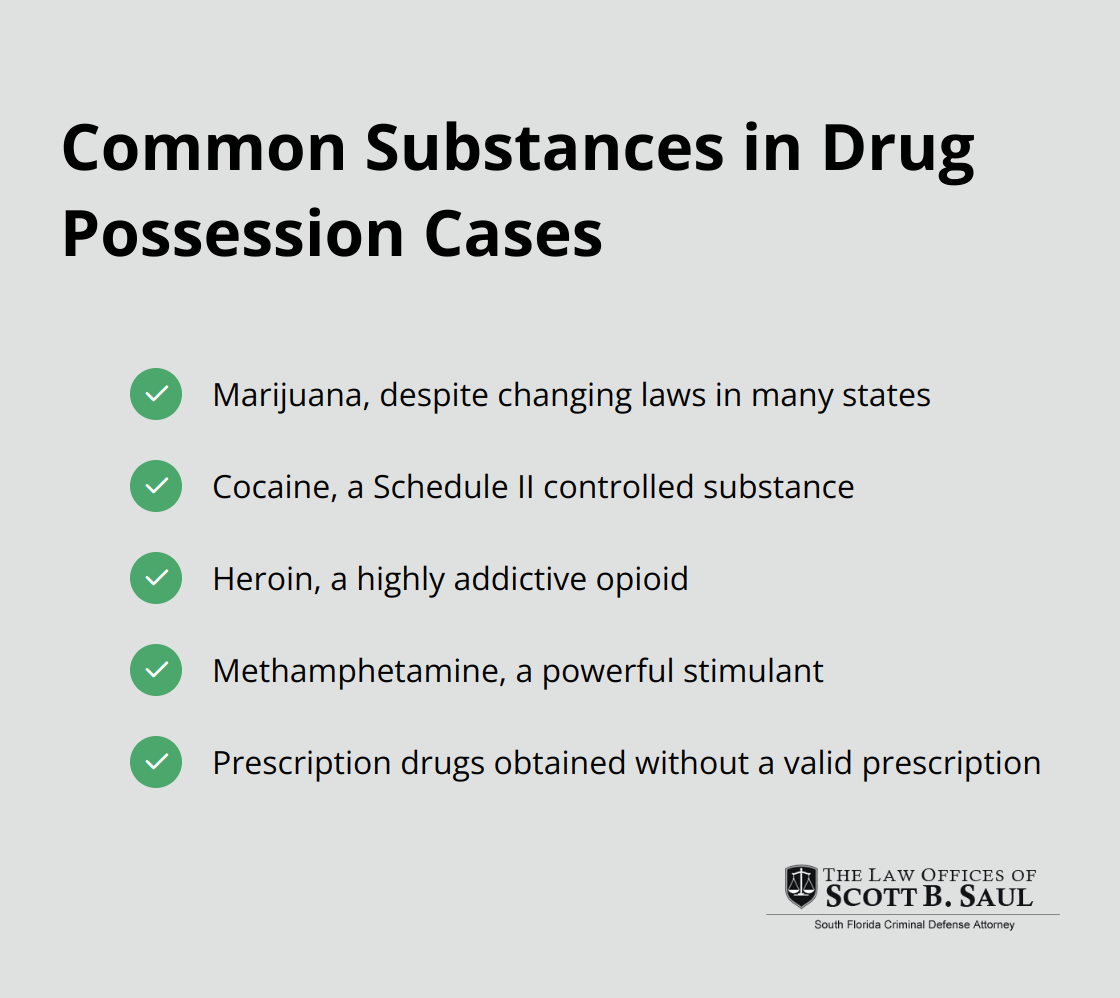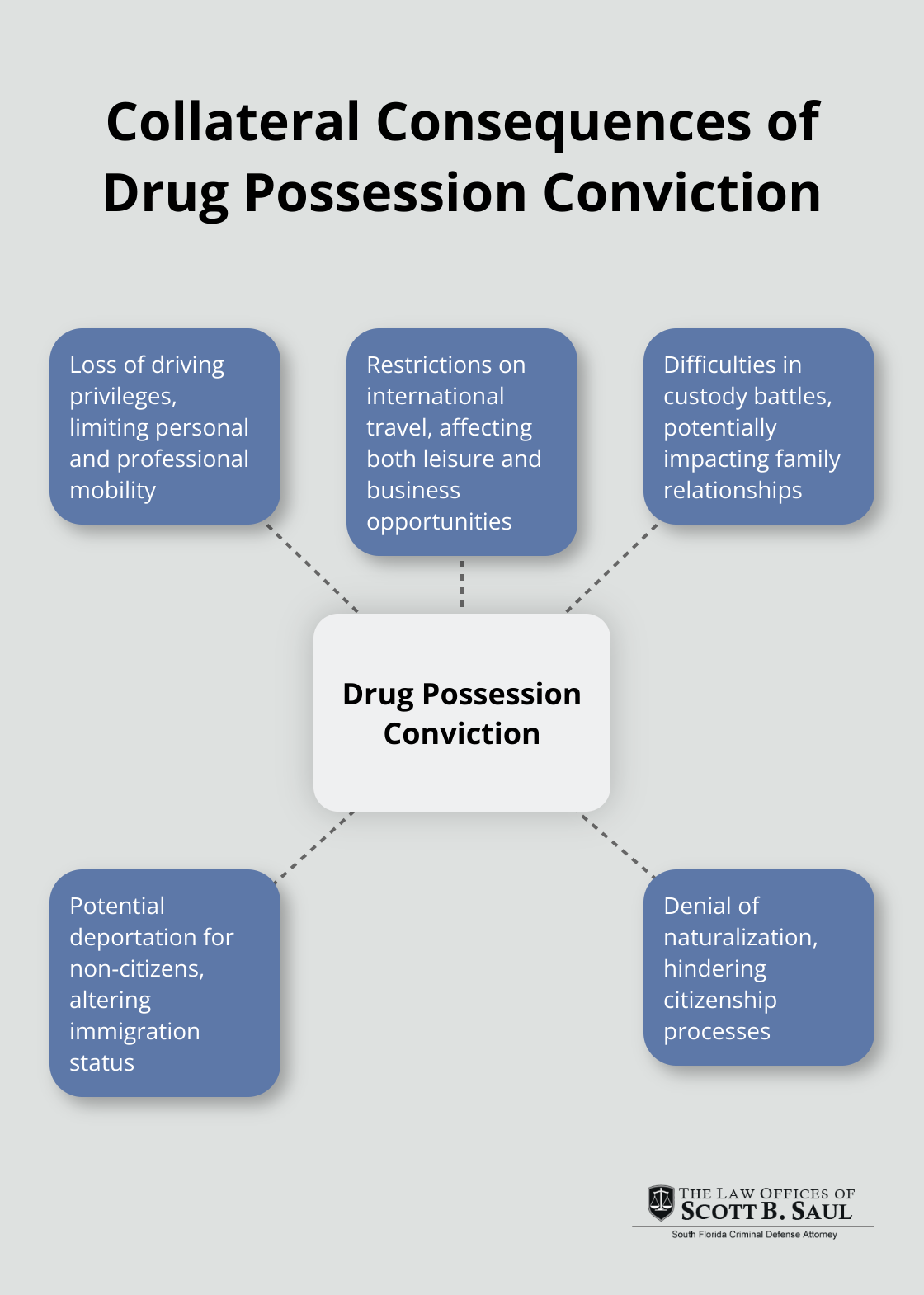How to Handle a First Offence Drug Possession Charge
By : saulcrim | Category : Criminal Defense | Comments Off on How to Handle a First Offence Drug Possession Charge
5th Jun 2025

Facing a first offense drug possession charge can be overwhelming and frightening. The legal consequences and potential impact on your future may seem daunting.
At Law Offices of Scott B. Saul, we understand the complexities of these cases and the importance of a strong defense strategy. This guide will help you navigate the legal process, understand your rights, and explore potential options for minimizing the impact of a first offense drug possession charge.
Understanding First Offense Drug Possession
Drug possession charges can alter your life dramatically, even as a first-time offender. This chapter will explain the key aspects of these charges and their potential impact on your future.
Defining Drug Possession
In legal terms, drug possession means having control over an illegal substance. This control can extend to drugs on your person, in your vehicle, or in your home. The type and quantity of the drug often determine the severity of the charge.
Common Substances in Possession Cases
Marijuana remains the most frequent drug in possession cases, despite changing laws in many states. Other substances often involved include:
- Cocaine
- Heroin
- Methamphetamine
- Prescription drugs (obtained without a valid prescription)

Misdemeanor vs. Felony Possession
The distinction between misdemeanor and felony possession can significantly impact your case outcome. Misdemeanors typically involve smaller quantities of drugs and carry lighter sentences. For example, in Florida, possessing 20 grams or less of cannabis is a misdemeanor of the first degree.
Felony charges are more serious. They often involve larger quantities or more dangerous substances. A felony conviction can result in lengthy prison sentences and substantial fines.
Factors Influencing Charges
Several factors can influence whether you face misdemeanor or felony charges:
- Drug type: Schedule I and II drugs (like heroin or cocaine) often lead to harsher penalties.
- Quantity: Larger amounts typically result in more severe charges.
- Intent: Evidence suggesting intent to distribute can elevate charges.
- Location: Possession near schools or parks may increase penalties.
The Importance of Immediate Action
If you face a first offense drug possession charge, you must act quickly. Early intervention can sometimes lead to reduced charges or alternative sentencing options. Don’t wait to seek legal counsel – the sooner you have an experienced attorney on your side, the better your chances of a favorable outcome.
As we move forward, we’ll explore the specific legal consequences that can result from a first offense drug possession charge. Understanding these potential outcomes is essential for preparing an effective defense strategy.
Legal Consequences of First Offense Drug Possession
Financial Penalties
First offense drug possession charges often result in significant financial burdens. In Florida, fines for a first-time possession charge range from $1,000 to $5,000 (depending on the substance and quantity). These fines come with additional court costs and fees, which can quickly accumulate. Some jurisdictions require defendants to pay for drug education or treatment programs as part of their sentence, further increasing the financial strain.
Potential Incarceration
While many first-time offenders hope to avoid jail time, incarceration remains a real possibility in drug possession cases. Sentences vary widely based on the case circumstances. For instance, possession of less than 20 grams of marijuana in Florida can lead to up to one year in jail. More serious charges, such as possession of cocaine or heroin, can result in up to five years in prison.
Long-Term Record Impact
A drug possession conviction on your record can have far-reaching effects. It may hinder your ability to:
- Find employment
- Secure housing
- Obtain professional licenses
Many employers conduct background checks, and a drug conviction often raises red flags. Additionally, a conviction can affect your eligibility for federal student aid, creating obstacles in pursuing higher education.
Collateral Consequences
Beyond immediate legal penalties, a drug possession conviction can lead to numerous collateral consequences. These may include:
- Loss of driving privileges
- Restrictions on international travel
- Difficulties in custody battles
For non-citizens, the stakes are even higher. A drug conviction can potentially lead to deportation or denial of naturalization.

Impact on Personal Life
The consequences of a first offense drug possession charge extend far beyond the courtroom. They can affect your personal relationships, career prospects, and overall quality of life for years to come. The stigma associated with a drug conviction can strain family ties and friendships, while the legal restrictions can limit your opportunities for personal and professional growth.
As we move forward, we’ll explore effective defense strategies that can help mitigate these severe consequences. Understanding your rights and the available legal options is the first step in building a strong defense against first offense drug possession charges.
Effective Defense Strategies for Drug Possession
Challenging the Search and Seizure
One of the most effective defense strategies involves scrutiny of the search and seizure that led to the drug discovery. Law enforcement must follow strict procedures when conducting searches. Any violation of these procedures can render the evidence inadmissible in court.
The Fourth Amendment exclusionary rule does not apply to evidence obtained by police who acted in objectively reasonable reliance on a statute authorizing the search. This highlights the importance of examining every detail of the arrest and search process.
Questioning Possession and Intent
Another key strategy challenges the prosecution’s claim of knowing possession of drugs. In some cases, defendants may lack awareness of drugs in their vicinity. This defense can prove particularly effective in situations involving shared living spaces or borrowed vehicles.
Intent also plays a significant role. Demonstration of no intention to use or distribute drugs may lead to reduced charges or even dismissal. For example, holding drugs for someone else without knowledge of their nature could form the basis of a strong defense.
Exploring Alternative Sentencing Options
Many jurisdictions offer alternative sentencing programs for first-time offenders. These programs often focus on rehabilitation rather than punishment and may include drug education classes, community service, or treatment programs.
The drug court program in Florida has shown promising results. Program participants generally had lower recidivism rates and lower numbers of new arrests compared to those who go through traditional court processes. This approach benefits not only the individual but also reduces the burden on the criminal justice system.
Importance of Legal Representation
Each case presents unique circumstances, and the most effective defense strategy depends on the specific details of the arrest and evidence. Consultation with an experienced criminal defense attorney (such as those at Law Offices of Scott B. Saul) immediately after arrest is vital to build a strong defense and protect your rights.

Leveraging Expert Testimony
In some cases, expert testimony can strengthen a defense strategy. Experts can provide insights on various aspects of the case, including:
- The reliability of drug testing methods
- The interpretation of physical evidence
- The psychological factors involved in addiction and drug use
Expert testimony can help create reasonable doubt or provide context that may influence the court’s decision.
Final Thoughts
A first offense drug possession charge requires immediate action. You must exercise your right to remain silent and decline to answer questions without an attorney present. Contact a qualified criminal defense lawyer as soon as possible to protect your rights and interests.
The consequences of a conviction extend beyond legal penalties, affecting employment, housing, education, and relationships. A robust defense from the outset can minimize these long-term impacts. An experienced attorney can navigate case complexities, challenge evidence, and explore alternative sentencing options.
At Law Offices of Scott B. Saul, we understand the gravity of drug possession charges. Our team specializes in crafting strong defenses for clients facing such charges. We offer personalized attention and aggressive representation to work towards the best possible outcome for your case.
Archives
- July 2025 (7)
- June 2025 (9)
- May 2025 (9)
- April 2025 (8)
- March 2025 (9)
- February 2025 (8)
- January 2025 (9)
- December 2024 (10)
- November 2024 (5)
- July 2024 (2)
- June 2024 (2)
- May 2024 (2)
- April 2024 (2)
- March 2024 (2)
- February 2024 (2)
- January 2024 (2)
- December 2023 (2)
- November 2023 (2)
- October 2023 (2)
- September 2023 (2)
- August 2023 (1)
- July 2023 (2)
- June 2023 (2)
- May 2023 (2)
- April 2023 (2)
- March 2023 (2)
- February 2023 (2)
- January 2023 (2)
- December 2022 (2)
- November 2022 (2)
- October 2022 (2)
- September 2022 (2)
- August 2022 (2)
- July 2022 (2)
- June 2022 (2)
- May 2022 (2)
- April 2022 (2)
- March 2022 (2)
- February 2022 (2)
- January 2022 (2)
- December 2021 (2)
- November 2021 (2)
- October 2021 (2)
- September 2021 (2)
- August 2021 (2)
- July 2021 (2)
- June 2021 (2)
- May 2021 (2)
- April 2021 (2)
- September 2020 (5)
- July 2020 (4)
- June 2020 (4)
- May 2020 (4)
- April 2020 (5)
- March 2020 (4)
- February 2020 (4)
- January 2020 (4)
- December 2019 (1)
- November 2019 (4)
- October 2019 (4)
- September 2019 (4)
- August 2019 (4)
- July 2019 (5)
- June 2019 (4)
- May 2019 (4)
- April 2019 (4)
- March 2019 (4)
- February 2019 (4)
- January 2019 (4)
- December 2018 (4)
- November 2018 (5)
- October 2018 (5)
- September 2018 (4)
- August 2018 (4)
- July 2018 (7)
- June 2018 (4)
- May 2018 (4)
- April 2018 (8)
- March 2018 (4)
- February 2018 (4)
- January 2018 (4)
- November 2017 (4)
- October 2017 (4)
- September 2017 (4)
- August 2017 (7)
- July 2017 (6)
- June 2017 (4)
- May 2017 (4)
- April 2017 (4)
- March 2017 (4)
- February 2017 (7)
- January 2017 (4)
- December 2016 (7)
- November 2016 (4)
- October 2016 (4)
- September 2016 (10)
- August 2016 (4)
- July 2016 (4)
- June 2016 (4)
- May 2016 (4)
- April 2016 (4)
- March 2016 (4)
- February 2016 (7)
- January 2016 (4)
- December 2015 (5)
- November 2015 (4)
- October 2015 (7)
- September 2015 (4)
- August 2015 (4)
- July 2015 (13)
- June 2015 (9)
- May 2015 (8)
- April 2015 (6)
- March 2015 (4)
- February 2015 (4)
- January 2015 (4)
- December 2014 (4)
- November 2014 (4)
- October 2014 (4)
- September 2014 (3)
Categories
- Adjudication (1)
- Bankruptcy (1)
- Burglary Crimes (3)
- calendar call (1)
- Car Accident (1)
- Criminal Defense (338)
- Cyber Crimes (7)
- DNA (1)
- Domestic Violence (9)
- Drug Crimes (5)
- DUI (12)
- Embezzlement (1)
- Environmental Crimes (4)
- Expungement Law (2)
- Federal Sentencing Law (3)
- Firearm (3)
- Forgery (4)
- General (82)
- Healthcare (3)
- Immigration (1)
- Indentity Theft (1)
- Insurance (5)
- judicial sounding (2)
- Juvenile Crimes (4)
- Manslaughter (4)
- Money Laundering (3)
- Organized Crime (1)
- Racketeering (1)
- Reckless Driving (3)
- RICO (3)
- Sealing and Expunging (2)
- Sex Offense (1)
- Shoplifting (1)
- Suspended Driver's License (1)
- Traffic (4)
- Trending Topics (1)
- White-collar Offenses (1)

